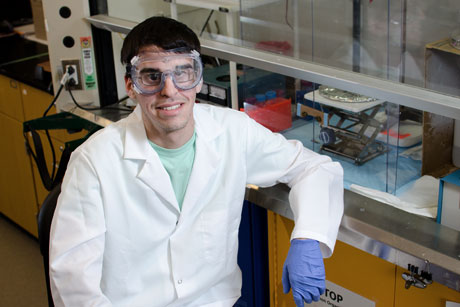Visually impaired undergrad has 'blind ambition'
By Stacey Shackford

Mark Colasurdo ’15 has a leg up on fellow biological engineering students when it comes to critical thinking and problem-solving. Because he’s legally blind, ingenuity and innovation are second nature to the New Jersey native, and he constantly comes up with creative workarounds to compensate for severe limitations to his vision.
Although he still maintains residual vision in one eye, Colasurdo uses assistive technology such as voiceover software to read most texts, and he incorporates nonvisual techniques in many aspects of his life.
He aspires to get a Ph.D. and pursue a career in biomedical engineering, perhaps in tissue engineering or regenerative medicine. He is well on his way, conducting research in the lab of new faculty member Minglin Ma, assistant professor of biological and environmental engineering, that involves creating synthetic scaffolding from polymer solutions and nanofibers thinner than spider webs, then culturing cells on the scaffolding.
Working on such a small scale complicates things, even for people with perfect vision. So how does Colasurdo manage it?
“I try to come up with nonvisual ways to figure it out, using the resources I have at hand. There’s usually a pretty simple workaround,” he said.
He might memorize the interface of lab equipment so he can operate it without looking, for instance, or use pipettes with digital displays and automatic volume settings, which are more precise anyway. In a previous lab, he transformed a closed circuit television system into a makeshift giant digital microscope to enlarge live images of bacterial cultures.
Colasurdo could ask for help or special equipment, but he’d rather try to come up with his own solutions first.
“Sometimes it’s just easier. And it’s nice to prove to myself that I can do it,” he said. “It’s important to me to learn how to be an independent researcher. Working late in the lab, I won’t always have someone around to help me.”
He hopes his experiences will help others. He has been involved with the National Federation of the Blind’s science and engineering division for several years, both as a mentee and a mentor, and he recently received a national scholarship from the organization.
“I think the problem with blindness is not the blindness itself; it’s being a minority in a majority world,” Colasurdo said. “It’s not a disability, it’s a different ability. Rather than trying to fix us, why not try to include us?”
“I have an inner curiosity for a lot of things, and that comes out through science and engineering. Blindness just makes things a little more interesting,” he added.
Stacey Shackford is staff writer for the College of Agriculture and Life Sciences.
Media Contact
Get Cornell news delivered right to your inbox.
Subscribe